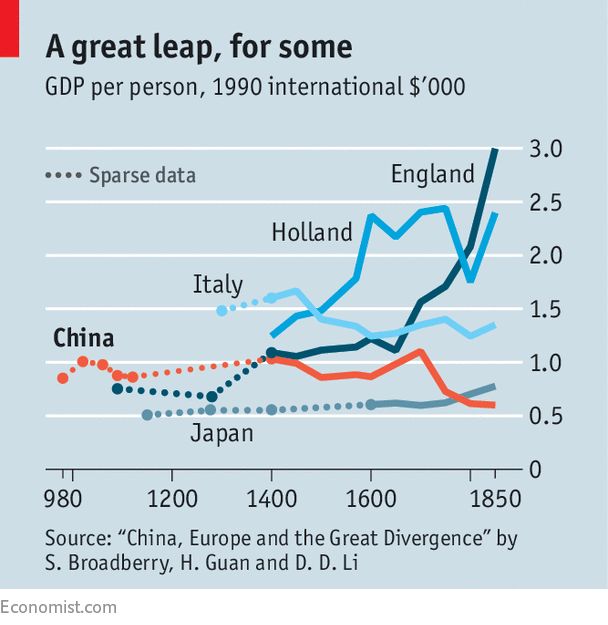China has been poorer than Europe longer than the party thinks
How will this affect Xi’s ”Chinese dream”?
来自“http://www.economist.com/”
按:中国仅仅是1840年之后才落后于西方的吗?牛津、北大、清华几位学者的研究给出了不同答案。他们以公元1000年为起点,比较了中国、英格兰、荷兰、意大利以及日本的人均 GDP。过去,我们一般认为,中国与西方在工业革命之前生活水平是相近的,但是研究结果显示,中国只是在11世纪时比其他国家富有,而到了1840年,人均 GDP 已经比最高点时跌落了1/3。但同时也有伦敦政治经济学院的学者质疑这一观点,认为现在比较不同国家的生活水平都不容易,遑论几个世纪以前。
XI JINPING, China’s president, likes to talk of his “Chinese dream”. He says it involves “the great rejuvenation of the Chinese nation”. To him this means that under the Communist Party, China will again be the world’s richest, most powerful country as it was before the “hundred years of humiliation”—the economic disasters and territorial grabs by foreigners during the century after the first opium war of 1839-42. By extension the party’s legitimacy will rest on this rejuvenation. But what if China was not the world’s richest country before 1839? What if it has lagged behind Europe not for 175 years but for 675? Would Mr Xi’s Chinese dream be so compelling?
A new study by Stephen Broadberry of Oxford University, Hanhui Guan of Peking University and David Daokui Li of
Tsinghua University in Beijing argues that China has indeed lagged behind Europe for centuries. It compares levels of GDP per person in China, England, Holland, Italy and Japan since around the year 1000. It finds the only period when China was richer than the others was during the 11th century. By that time China had invented gunpowder, the compass, movable type, paper money and the blast furnace.
movable type: 活字印刷
blast furnace: 高炉,鼓风机炉
But according to Mr Broadberry and his co-authors, Italy had caught up with China before 1300, and Holland and England by 1400. Around 1800 Japan overtook China as the richest Asian country. Chinese GDP per person fell relentlessly during the Qingdynasty (1644-1912). In 1620, it was roughly the same as it had been in 980. By 1840, it had fallen by almost a third (see chart).
These findings challenge a hitherto common belief that China and Europe had similar living standards for centuries until the West’s industrial revolution began in the late 18th century: a point often referred to by historians as the “great divergence”. This view, promoted by Kenneth Pomeranz of the University of Chicago, lends more support to the party’s understanding.
hitherto: 迄今为止
Researchers used not to be able to work out GDP from 1,000 years ago. Angus Maddison, an economic historian, was among the first to try. But the research by Mr Broadberry and his colleagues, which scales up local and private records to generate national accounts, offers greater detail. The first study of Britain’s historical GDP using this technique appeared in 2008. It was followed quickly by other ones focusing on Holland, Italy and now on China.
scale up: 按比例增加
Doubts remain about the quality of the Chinese data. A recent study by Kent Deng and Patrick O’Brien of the London School of Economics argues they are too fragmentary. It is hard enough comparing the living standards of different countries today, let alone doing so in the distant past with far less precise statistics. Mr Broadberry responds that China’s historical sources are no worse than those available for medieval England. He also notes
that imperial China and early-modern Europe both used silver as a unit of value, facilitating comparison.
fragmentary: 零碎的,不完全的
But there remains a vital difference of scale. Italy and the Holland were the richest parts of Europe in the 14th and 15th centuries. It might be better to compare them not with China as a whole but with its richest part, the Yangzi delta, around modern-day Shanghai. If you do that, England and Holland were still richer than the Yangzi area in 1800 but the point at which they overtook the delta turns out to be around 1700. This is not so different from Mr Pomeranz’s view that the great divergence happened in the 18th century. But it still means the process had
begun before the industrial revolution, which in turn implies that European wealth and Chinese poverty cannot be explained by industrialisation: they must reflect institutional differences.
Mr Xi would do better to consider a different source of legitimacy from history: poverty reduction. If Mr Broadberry and his co-authors are right, Chinese peasants saw almost 1,000 years of decline and misery after 1000. But Mr Xi’s party has massively reduced rural poverty and hopes to eradicate it by 2020. That is an achievable dream.
